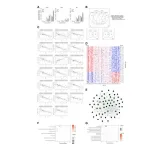(Press-News.org) Philadelphia, March 15, 2024 – Researchers from Children’s Hospital of Philadelphia (CHOP) identified a key metabolite in cells that helps direct immune responses and explains at a single cell level why immune cells that most efficiently recognize pathogens, vaccines, or diseased cells grow and divide faster than other cells. The findings also indicate that a better understanding of this metabolite and its role in immune response could improve the design of immunotherapies and create longer-lived responses against different types of cancer as well as enhance vaccine strategies. The findings were published online today by the journal Science Immunology.
Antigens are foreign substances that our immune system recognizes and responds to by producing more T and B cells. These cells each have unique receptors that recognize specific antigens and can respond appropriately, and they can “remember” and respond similarly when exposed to the same antigen again. How well a T or B cell to sees its antigen is known as its affinity. This fundamental concept of immunology is how vaccines work. When those T and B cells encounter a pathogen, the body needs the ones that recognize their antigen the best, with high affinity, to divide more quickly to produce more daughter cells and “attack” the invader.
However, the underlying mechanisms as to why high affinity immune cells respond more efficiently have remained a mystery for researchers. After seeing an antigen, the chemistry inside T and B cells needs to change to allow them to properly respond. The researchers in this study wanted to look at metabolism to understand what causes high affinity cells to know that they need to divide more quickly to respond appropriately.
“We wanted to see if specific metabolites were sensitive to T cell receptor affinity and controlled T cell expansion during immune responses,” said senior study author Will Bailis, PhD, Assistant Professor of Pathology and Laboratory Medicine at CHOP and the Perelman School of Medicine of the University of Pennsylvania.
The researchers identified nicotinamide adenine dinucleotide (NAD) as a key, affinity-dependent component of T cell receptor metabolic reprogramming during the early stages of a T cell activation. Using flow cytometry, the researchers could look at NAD in single cells immediately after activation and show how it dictates the number of times T cells can divide in the future. Therefore, researchers could essentially predict how T cells behave and how many times they divide based on how much NAD they started with.
Additionally, the researchers found that manipulating how much NAD a cell was allowed to make could control when that cell went from a resting state to wanting to divide, suggesting that the metabolite could be used to improve response in certain T cell-driven therapies or vaccines.
“We believe this work shows how single cell differences in metabolism are a key reason why similar cells sometimes display strikingly different behaviors and that this may provide insight into underlying processes that drive disease and dysfunction that cannot simply be explained by gene regulation or signaling,” Bailis said. “With more work, we also believe that this information could potentially be used to improve vaccine strategies and the response and durability of cell-based therapies used to treat cancer and other diseases.”
This study was supported by National Institutes of Health grants K22AI141758, R35GM138085, R01DK098656, R01HL165792, P30ES013508, R01AI165706, and F31CA261156, a Children’s Hospital of Philadelphia Cell and Gene Therapy Collaborative SEED Award, a Children’s Hospital of Philadelphia Junior Faculty Pilot Grant, Transfusion Medicine Research Training Program grant 2T32HL00777528, Microbial Pathogenesis and Genomics Training Grant 5T32AI141393, and Immunobiology of Normal and Neoplastic Lymphocytes Training Grant T32CA009140.
Turner et al, “Single-cell NAD(H) levels predict clonal lymphocyte expansion dynamics.” Sci Immunol. Online March 15, 2024. DOI: 10.1126/sciimmunol.adj7238.
About Children’s Hospital of Philadelphia:
A non-profit, charitable organization, Children’s Hospital of Philadelphia was founded in 1855 as the nation’s first pediatric hospital. Through its long-standing commitment to providing exceptional patient care, training new generations of pediatric healthcare professionals, and pioneering major research initiatives, the hospital has fostered many discoveries that have benefited children worldwide. Its pediatric research program is among the largest in the country. The institution has a well-established history of providing advanced pediatric care close to home through its CHOP Care Network, which includes more than 50 primary care practices, specialty care and surgical centers, urgent care centers, and community hospital alliances throughout Pennsylvania and New Jersey, as well as the Middleman Family Pavilion and its dedicated pediatric emergency department in King of Prussia. In addition, its unique family-centered care and public service programs have brought Children’s Hospital of Philadelphia recognition as a leading advocate for children and adolescents. For more information, visit https://www.chop.edu.
END
CHOP researchers discover key metabolic process responsible for rapid immune responses
A metabolite called NAD encourages immune cells to divide more quickly and could be used to improve efficacy of cell-based therapies
2024-03-15
ELSE PRESS RELEASES FROM THIS DATE:
Gut bacteria make neurotransmitters to shape the newborn immune system
2024-03-15
Weill Cornell Medicine investigators discovered that unique bacteria colonize the gut shortly after birth and make the neurotransmitter serotonin to educate gut immune cells. This prevents allergic reactions to food and the bacteria themselves during early development.
The preclinical study, published in Science Immunology on Mar. 15, showed that bacteria abundant in the guts of newborns produce serotonin, which promotes the development of immune cells called T-regulatory cells or Tregs. These cells suppress inappropriate immune ...
Lesbian, gay and bisexual women smoke more, are less likely to quit
2024-03-15
People who identify as lesbian, gay and bisexual – particularly women – respond more positively to tobacco marketing, are more inclined to smoke cigarettes daily and may have a more difficult time quitting, according to two studies by a Rutgers Health researcher.
The studies, published in the Annals of LGBTQ Public and Population Health and Preventive Medicine Reports, investigated how some among the LGBTQ population respond to tobacco marketing, how they use tobacco and their history of quitting using two large national datasets, including the Population Assessment of Tobacco and ...
RPI researchers awarded $1.5 million to produce hemp-based insulated siding
2024-03-15
Researchers from Rensselaer Polytechnic Institute (RPI) will use hemp to develop a commercially viable, durable, and low-embodied-carbon insulated siding product to address what the U.S. Green Building Council says is a “crucial need for building retrofits to improve energy efficiency and reduce carbon emissions.”
The three-year, $1.5 million award given as part of the Buildings Energy Efficiency Frontiers and Innovation Technologies (BENEFIT) funding opportunity from the United States Department of Energy (DOE) will support RPI faculty and industry partners in creating Hemp Retrofit Structural Insulated Panel (HeRS), a hemp-based insulated siding system that ...
Cracking the pear genome: how students helped unlock a new tool for the pear industry
2024-03-15
Pears are big business in the Pacific Northwest US. But did you know that traditional pear breeding has remained largely unchanged for centuries? This slow process is difficult and costly, requiring the long-term commitment of labor, materials, and land-space resources. However, traditional pear breeding might get some help from genomics, thanks to a unique collaboration between students, scientists, and the pear industry fostered through an initiative called the American Campus Tree Genomes (ACTG).
ACTG was born from two professors’ ...
How the brain translates motivation into goal-oriented behavior, according to new study
2024-03-15
BIRMINGHAM, Ala. – Hunger can drive a motivational state that leads an animal to a successful pursuit of a goal — foraging for and finding food.
In a highly novel study published in Current Biology, researchers at the University of Alabama at Birmingham and the National Institute of Mental Health, or NIMH, describe how two major neuronal subpopulations in a part of the brain’s thalamus called the paraventricular nucleus participate in the dynamic regulation of goal pursuits. This research provides insight into the mechanisms by which the brain tracks motivational ...
Genome-wide transcriptome profiling and development of age prediction models in the human brain
2024-03-15
“Our approach identified genes that were previously implicated in aging, as well as new ones that may warrant further investigation.”
BUFFALO, NY- March 15, 2024 – A new research paper was published on the cover of Aging (listed by MEDLINE/PubMed as "Aging (Albany NY)" and "Aging-US" by Web of Science) Volume 16, Issue 5, entitled, “Genome-wide transcriptome profiling and development of age prediction models in the human brain.”
Aging-related transcriptome changes in various regions of the healthy human brain have been explored in previous works, however, a study to develop prediction models for age based on the expression levels of specific ...
Speaking without vocal cords, thanks to a new AI-assisted wearable device
2024-03-15
People with voice disorders, including those with pathological vocal cord conditions or who are recovering from laryngeal cancer surgeries, can often find it difficult or impossible to speak. That may soon change.
A team of UCLA engineers has invented a soft, thin, stretchy device measuring just over 1 square inch that can be attached to the skin outside the throat to help people with dysfunctional vocal cords regain their voice function. Their advance is detailed this week in the journal Nature Communications.
The new bioelectric system, developed ...
Rice breakthrough could make automated dosing systems universal
2024-03-15
by Jade Boyd
Special to Rice News
HOUSTON – (March 15, 2024) – Rice University synthetic biologists have found a way to piggyback on the glucose monitoring technology used in automated insulin dosing systems and make it universally applicable for the monitoring and dosing of virtually any drug.
In a recently published study in Nature Communications, researchers in the lab of Caroline Ajo-Franklin demonstrated the technique by modifying a blood-glucose sensor to detect the anticancer drug afimoxifene ...
UTA students earn transformative D.C. fellowships
2024-03-15
Seven undergraduate students from The University of Texas at Arlington headed to Washington, D.C., for a hands-on program to live, learn and intern in the nation’s capital.
Founded in 2001, The Archer Center is the Washington, D.C., campus of the University of Texas System. Students accepted to its Archer Fellowship Program move to the Capitol Hill area of Washington to live with other Archer Fellows and take courses taught by UT faculty and policy experts. The scholars also participate in a ...
Why some newborns develop severe infections
2024-03-15
NEW YORK, NY (March 15, 2024)--Compared to adults, newborns are highly susceptible to infections and these infections can cause serious health complications and even death.
One factor known to affect a newborn’s response to infection is a condition called neonatal neutropenia, in which the infant fails to make enough neutrophils, the immune system’s first responders. What underlies this immune deficiency, which greatly increases a newborn’s susceptibility to infection, is largely unknown, leaving clinicians with little understanding of how to prevent or treat it.
A new study of mice by Columbia University ...
LAST 30 PRESS RELEASES:
Brain cells drive endurance gains after exercise
Same-day hospital discharge is safe in selected patients after TAVI
Why do people living at high altitudes have better glucose control? The answer was in plain sight
Red blood cells soak up sugar at high altitude, protecting against diabetes
A new electrolyte points to stronger, safer batteries
Environment: Atmospheric pollution directly linked to rocket re-entry
Targeted radiation therapy improves quality of life outcomes for patients with multiple brain metastases
Cardiovascular events in women with prior cervical high-grade squamous intraepithelial lesion
Transplantation and employment earnings in kidney transplant recipients
Brain organoids can be trained to solve a goal-directed task
Treatment can protect extremely premature babies from lung disease
Roberto Morandotti wins prestigious Max Born Award for pioneering research in quantum photonics
Scientists map brain's blood pressure control center
Acute coronary events registry provides insights into sex-specific differences
Bar-Ilan University and NVIDIA researchers improve AI’s ability to understand spatial instructions
New single-cell transcriptomic clock reveals intrinsic and systemic T cell aging in COVID-19 and HIV
Smaller fish and changing food webs – even where species numbers stay the same
Missed opportunity to protect pregnant women and newborns: Study shows low vaccination rates among expectant mothers in Norway against COVID-19 and influenza
Emotional memory region of aged brain is sensitive to processed foods
Neighborhood factors may lead to increased COPD-related emergency department visits, hospitalizations
Food insecurity impacts employees’ productivity
Prenatal infection increases risk of heavy drinking later in life
‘The munchies’ are real and could benefit those with no appetite
FAU researchers discover novel bacteria in Florida’s stranded pygmy sperm whales
DEGU debuts with better AI predictions and explanations
‘Giant superatoms’ unlock a new toolbox for quantum computers
Jeonbuk National University researchers explore metal oxide electrodes as a new frontier in electrochemical microplastic detection
Cannabis: What is the profile of adults at low risk of dependence?
Medical and materials innovations of two women engineers recognized by Sony and Nature
Blood test “clocks” predict when Alzheimer’s symptoms will start
[Press-News.org] CHOP researchers discover key metabolic process responsible for rapid immune responsesA metabolite called NAD encourages immune cells to divide more quickly and could be used to improve efficacy of cell-based therapies






